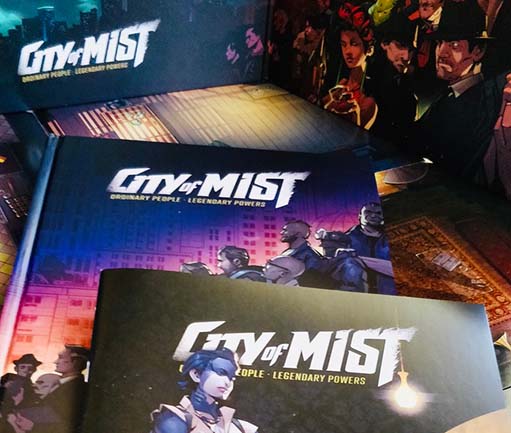What are tabletop role-playing games?
Group therapy can be more engaging than you ever imagined! Tabletop role-playing games (TTRPGs) are a form of roleplay where players get to design their own characters, and participate in an unfolding story by describing their characters’ actions and rolling dice to determine the outcome of those actions. TTRPGs provide a safe space for players to embrace their creativity, develop social skills, and learn more about themselves.
The benefits of role-playing games can be life-changing—especially for neurodivergent, highly sensitive, and twice exceptional clients. Autistic players in particular can benefit from having a space to explore who they are, and how they want to engage with the world around them.
One TTRPG we’ve been loving here at TheraThrive is City of Mist—a game about an enchanted city where characters are part human, part myth. Players get to select a fictional character to base themselves on, and inherit the powers, values, and hardships of that character. As they begin unraveling the city’s mysteries, they must decide who they are and what they stand for.
TTRPGs can help players to learn to regulate emotions
Many autistic people are highly sensitive, and can struggle with emotional regulation more than allistic (non-autistic) individuals. Emotional regulation is the ability to navigate intense emotions without becoming overpowered or resorting to unhealthy coping mechanisms. Factors that can help with emotional regulation include positive self-talk, flexibility, and the ability to reach out for support.
In TTRPGs, players undergo a number of situations which challenge them to cope with frustration, perfectionism, and disappointment. Despite players’ best efforts, their characters sometimes experience setbacks and loss. In City of Mist, characters are torn between the ordinary and mythical parts of their personas—between their real-life identities, and the legends unfolding beneath the surface.
The challenges they face teach them to adapt to changing conditions, and encourage them to rise to their destinies. Many players take on issues which mirror ones they are facing outside of the game, and practice navigating their emotions from a comfortable distance. Within the safety of the game, players get a chance to see how setbacks make their characters stronger, and learn to accept success and failure as equally important parts of life.
TTRPGs can help players experiment with role expansion and world building
In everyday life, each of us have a number of roles we step into at different times. For adolescents, some of these roles might be autistic, gifted, outcast, student, friend, artist, or geek. As we grow up, we get to decide which of these roles we want to hold onto, and which we want to let go of.
Autistic individuals are often pressured to fit into societal roles that don’t fit them. They are surrounded by unspoken social rules and expectations, and can sometimes experience an overwhelming pressure to fit in.
TTRPGs create space for players to try on different roles, which might feel scary, ambitious, unrealistic, or even frowned upon in real life. An RPG character can be any gender, have any job, dress in any way, and have unlimited interests and motivations. In City of Mist, each character has specific strengths and weaknesses, core identity traits, and a defining event that shaped the course of their life. The world of the game becomes a nonjudgemental place for players to experiment with these attributes, free from the constraints of a society which seeks to put us all in boxes.
TTRPGs can help players build community with like-minded peers
In a society dominated by neurotypical social expectations, it can be difficult for autistic individuals to cultivate meaningful friendships and relationships. Many autistic people struggle with social skills, or have a difficult time meeting like-minded peers—despite having so much to offer.
In TTRPGs, players learn to connect with each other outside of the constrictive norms of many real-life social settings. As part of a larger group, they have the chance to navigate both fantastical and mundane situations as a team. Each player is able to see the unique contributions they bring to the table, and receives appreciation and positive feedback from peers.
In City of Mist, players bond over their adventures, and confide in one another about the hardships they experience. At the start of each round, they answer questions about their characters’ motivations, and—over time—develop a larger emotional vocabulary. They form attachments to other players, navigate complex social dynamics, and personally evolve as their characters grow and develop within the world of the game. These skills can be brought back into daily life, where social stakes are higher and bonding experiences of this kind are harder to come by.
Join us!
Interested in grabbing a pair of dice and joining us? Click here to learn more about our RPG group offerings and other groups, and click here to schedule an intake with us here!
TTRPGs can help players explore their creativity and special interests
A big part of autism is the cultivation of special interests—interests which come with higher focus, greater dedication, and more intensity than those of neurotypicals. For example, it is not uncommon for folks on the spectrum to watch a beloved film or TV series until it is memorized, engage in extremely in-depth research on specific topics, or commit an impressive amount of special interest-related facts to memory.
Because allistic individuals tend to engage with interests at a more shallow level, it can be hard for autistic folks to find an outlet for their enthusiasm. TTRPGs provide folks on the spectrum with an opportunity to explore special interests in an engaging and immersive way.
Because City of Mist characters are based on figures from fiction, myth, and legend, players are able to embody fictional characters from their favorite TV series, video games, books, comics, and even albums. Players have a chance to not only share about their interests with supportive peers, but to actually step into the worlds that so fascinate them, and get to know themselves through the framework of their special interests.




0 Comments